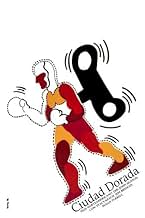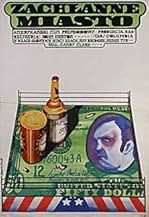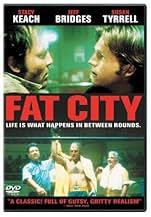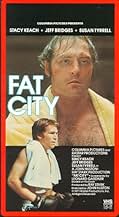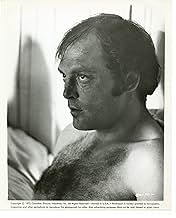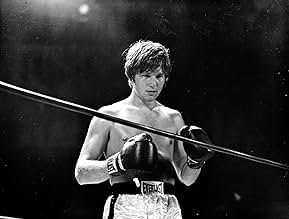NOTE IMDb
7,2/10
11 k
MA NOTE
Deux hommes qui travaillent comme boxeurs professionnels en viennent aux mains lorsque leurs carrières respectives prennent des tours différents.Deux hommes qui travaillent comme boxeurs professionnels en viennent aux mains lorsque leurs carrières respectives prennent des tours différents.Deux hommes qui travaillent comme boxeurs professionnels en viennent aux mains lorsque leurs carrières respectives prennent des tours différents.
- Nommé pour 1 Oscar
- 4 victoires et 4 nominations au total
Álvaro López
- Rosales
- (non crédité)
Carl D. Parker
- Paymaster
- (non crédité)
Bill Riddle
- Boxer
- (non crédité)
Al Silvani
- Referee at Tully-Lucero Fight
- (non crédité)
Avis à la une
Fat City is a small film directed on location in Stockton, California by legendary director John Huston.
It is about small time boxers and small time losers. Stacy Keach is a washed up boxer, a drunk, making a comeback but really not up to it. He is in a tempestuous relationship with Susan Tyrell who is magnificent as his drunk girlfriend. The booze oozes out of her pores and she really cracks that paralytic look in her face.
Jeff Bridges is the up and coming boxer but he immediately loses his early fights, he gets his pretty girlfriend, Candy Clark pregnant and gets some irregular work as a labourer sometimes working with Keach in the fields.
There is nothing grandiose or bombastic about Fat City. It really is introverted dealing with the underclass in the early 1970s. The location filming adds a lot of authenticity and rawness.
Keach who was a noted Shakespearean actor of the American stage is very believable. He plays not a has been but a never was, who wants to have that one final crack of something big but he will get nowhere it as he always gets sidetracked, usually by booze.
Bridges at the time was the young up and comer with a mixture of enthusiasm and wide eyed innocence. He was 23 years old when he made this film and was already a veteran with an Oscar nomination to his name as he was a child actor working in his father's show.
A critic pointed out something novel about this boxing film. These almost desperate people we meet go out of their way to be kind to each other no matter how hopeless their situation.
When Keach argues with Tyrell you expect that he will hit her. When her ex-boyfriend turns up, you again expect that he will get in a fight with Keach. However you find people struggling to be nice and civil to each other.
Boxing actually plays a small part in the film. Fat City is a forgotten gem of 1970s cinema.
It is about small time boxers and small time losers. Stacy Keach is a washed up boxer, a drunk, making a comeback but really not up to it. He is in a tempestuous relationship with Susan Tyrell who is magnificent as his drunk girlfriend. The booze oozes out of her pores and she really cracks that paralytic look in her face.
Jeff Bridges is the up and coming boxer but he immediately loses his early fights, he gets his pretty girlfriend, Candy Clark pregnant and gets some irregular work as a labourer sometimes working with Keach in the fields.
There is nothing grandiose or bombastic about Fat City. It really is introverted dealing with the underclass in the early 1970s. The location filming adds a lot of authenticity and rawness.
Keach who was a noted Shakespearean actor of the American stage is very believable. He plays not a has been but a never was, who wants to have that one final crack of something big but he will get nowhere it as he always gets sidetracked, usually by booze.
Bridges at the time was the young up and comer with a mixture of enthusiasm and wide eyed innocence. He was 23 years old when he made this film and was already a veteran with an Oscar nomination to his name as he was a child actor working in his father's show.
A critic pointed out something novel about this boxing film. These almost desperate people we meet go out of their way to be kind to each other no matter how hopeless their situation.
When Keach argues with Tyrell you expect that he will hit her. When her ex-boyfriend turns up, you again expect that he will get in a fight with Keach. However you find people struggling to be nice and civil to each other.
Boxing actually plays a small part in the film. Fat City is a forgotten gem of 1970s cinema.
American audiences don't generally go in for realistic stories of human despair and suffering that offer very little in the way of hope or relief. This may explain why John Huston's Fat City has been condemned to obscurity, a real shame considering what a great flick it is. It's the sort of movie you see and remember but can't quite pick it out of a line-up... a shuffling, mumbling story of down-and-out pugs in an off-the-map burgh. You're taunted with the possibilities of the story picking up to... well if not epic at least noteworthy proportions... but, all of the characters' minor victories are mitigated by their simultaneous defeats. Keach's Tully is the main thrust of the story, though it tends to veer off on the occasional tangent. A has-been who possibly never really was, crushed by the departure of his wife and overwhelmed by the constant little defeats in his life. Huston really drives this point home, that all of these little defeats add up. Without giving too much away, suffice to say Fat City is a film where mood overshadows plot. The mood is indelibly rendered by Conrad Hall's dark, dirty images, which nearly swallow the characters in the depth of their shadows. Watching it back to back with fellow pugilist opus Raging Bull (1980), it's easy to see that Huston was a keen observer of human behaviour, while Scorsese was a keen observer of Hollywood films of the thirties. And don't even talk about Rocky. I would compare it favourably with Barbet Schroeder's Barfly (1987), another film about fringe life in California, and even Vincent Gallo's excellent Buffalo '66 (1998), though of the three it is the bleakest and the least accessible.
John Huston is amazing to me. He defined an entire genre with his foot barely in the Hollywood door, then he kicked the door down and walked in to clear well deserved Oscars as both writer and director, he took his Oscars with him to Africa to get hammered with Erol Flynn and go out on safaris leaving behind him a big production to go to hell, then came back to find they had nailed a new door in place of the one he had torn down so he didn't bother to knock at all this time, he packed his things and went to a small dingy bar where Mexicans and barflies go to kill their time to make movies about killing time, movies about misfits and people who are dead inside, movies like Fat City and Under the Volcano, to adapt Flannery O'Connor and James Joyce, to soar above and beyond what anyone might have expected from any director of his generation. It's 1972 and John Huston is still relevant as ever. How many directors can you name who turned out some of their best material in their fifth decade directing movies? Venerable relics like Clint Eastwood move over, American cinema (not simply Hollywood) already had a patriarch in place long before any of you looked through a viewfinder.
It's also amazing to me how an indomitable absolute badass of a successful director can know failure so well. This is a movie where people box but it's not about boxing. There's no triumph to be had here and the crowd gathered in the small suburban boxing hall in Stockton, California, to pass their time is not there to be pleased. Most of them are probably the same kind of deadbeat with no future and a sh-tty job as the third-grade boxers who beat each other for their amusement. We get the young upstart boxer with the fast legs and a bright future ahead of him if only someone could train him right but this character can only make sense when we see him standing next to Stacy Keach, the aging boxer who won't see thirty again and who maybe had a chance once but blew it for women and alcohol and now he's desperate for one last throw of the dice.
The sad beauty of Fat City is that we're not looking at some kind of last defiant stand, we don't enter the ring for one last moment of triumph with the lights blaring bright and the crowd cheering, this is not The Wrestler anymore than it is Rocky, the lights were not only dimmed long ago but they probably never shone bright enough anywhere except in the protagonist's head. The closest Stacy Keach came to glory some odd 10 years ago was in itself a failure. Were his eyebrows slashed with a razor or not that fateful night down in Mexico we never find out. For most of its duration Fat City is a beaten man with sunken cheeks and a grim unshaven wan face wearing an expression of incredulous outrage.
Then we're inside a rundown cafe, the walls are painted in sickly washed-out colors and old men play cards around tables in felt, and we sit down for one last cup of coffee on the cheap formica counter. We see the young boxer standing next to the washed-up has-been one who can't even be a mentor anymore and an old man, a walking shell of someone "who was maybe young once", comes over to serve us and it all makes sense. "Maybe he's happy" says the young one. "Maybe we all are" says the other, and we know we're not, life doesn't quite work out that way, but it's all we have. The old man turns and smiles a toothless smile (senile or knowing, who's to say) and Fat City fades out into one of the most touching heartfelt endings I've seen. Fatalists cannot afford to miss this one, it's the stuff dashed hopes and broken lives are made of. Rejoice.
It's also amazing to me how an indomitable absolute badass of a successful director can know failure so well. This is a movie where people box but it's not about boxing. There's no triumph to be had here and the crowd gathered in the small suburban boxing hall in Stockton, California, to pass their time is not there to be pleased. Most of them are probably the same kind of deadbeat with no future and a sh-tty job as the third-grade boxers who beat each other for their amusement. We get the young upstart boxer with the fast legs and a bright future ahead of him if only someone could train him right but this character can only make sense when we see him standing next to Stacy Keach, the aging boxer who won't see thirty again and who maybe had a chance once but blew it for women and alcohol and now he's desperate for one last throw of the dice.
The sad beauty of Fat City is that we're not looking at some kind of last defiant stand, we don't enter the ring for one last moment of triumph with the lights blaring bright and the crowd cheering, this is not The Wrestler anymore than it is Rocky, the lights were not only dimmed long ago but they probably never shone bright enough anywhere except in the protagonist's head. The closest Stacy Keach came to glory some odd 10 years ago was in itself a failure. Were his eyebrows slashed with a razor or not that fateful night down in Mexico we never find out. For most of its duration Fat City is a beaten man with sunken cheeks and a grim unshaven wan face wearing an expression of incredulous outrage.
Then we're inside a rundown cafe, the walls are painted in sickly washed-out colors and old men play cards around tables in felt, and we sit down for one last cup of coffee on the cheap formica counter. We see the young boxer standing next to the washed-up has-been one who can't even be a mentor anymore and an old man, a walking shell of someone "who was maybe young once", comes over to serve us and it all makes sense. "Maybe he's happy" says the young one. "Maybe we all are" says the other, and we know we're not, life doesn't quite work out that way, but it's all we have. The old man turns and smiles a toothless smile (senile or knowing, who's to say) and Fat City fades out into one of the most touching heartfelt endings I've seen. Fatalists cannot afford to miss this one, it's the stuff dashed hopes and broken lives are made of. Rejoice.
The 1970s produced some of the greatest American movies of all time, that's indisputable. But while everyone focuses on (the admittedly very good) more famous works by Scorsese and Coppola, many equally worthwhile movies get little attention - 'Bring Me The Head Of Alfredo Garcia', 'Scarecrow', 'Fingers', 'Tracks', 'The Panic In Needle Park', 'Blue Collar', and this one, arguably John Huston's most underrated film. The four leads Stacey Keach ('The Ninth Configuration'), Jeff Bridges ('The Last Picture Show'), Susan Tyrrell ('The Killer Inside Me'), and Candy Clark ('American Graffiti') are all outstanding, and in Keach's case it's possibly his finest performance to date. What an underrated actor Keach is! This is a powerful and haunting look at the underbelly of American working class life, a subject very rarely dealt with honestly in contemporary Hollywood films. 'Fat City' doesn't deserve its obscurity. It is a small masterpiece. Highly recommended to people who value downbeat and realist dramas more than dumbed down popcorn "entertainment".
Fat City has deservedly taken its place among the fine films about boxing that Hollywood has done. It most closely resembles Requiem For A Heavyweight and you get double the entertainment because it's about two boxers in that division whose prospects for success are limited.
Stacy Keach and Jeff Bridges meet at a YMCA gym. Keach a heavyweight who has seen better days was a good prospect to go all the way, but he married the wrong woman who drained him dry and left him. But Keach is a glutton for punishment and he's taken up with Susan Tyrell who is mesmerizing when she's on the screen. Not that the prospects are good for him to hold out for something better, he's no prize either.
But Keach sends Bridges to his former manager Nicholas Colosanto and he also joins them. Bridges has never had a professional fight, but he's clean cut, all American and white. He might be a good draw if he can learn to fight. His debut isn't promising. And he and wife Candy Clark face the problems of all newlyweds.
The air of sadness that hangs around Fat City is that the audience knows full well these guys aren't going anywhere. Keach gets matched with a similar over the hill heavyweight played nicely by Sergio Rodriguez. He barely outlasts him and while the little entourage is celebrating this beginning of a comeback, we see Sergio leave the arena alone as the lights turn out after him. Very effectively staged by John Huston.
The highlight of Fat City is Susan Tyrell who as TCM was showing this film as its prime time feature was reported to have passed away. What an incredible performance as a down and out alcoholic. She received the only Oscar recognition for Fat City as she was nominated for a Best Supporting Actress Oscar.
Boxing fans will appreciate the realistic approach Fat City takes in regard to the sport. Others of us will just like the great performances and realistic filming that typifies Fat City.
Stacy Keach and Jeff Bridges meet at a YMCA gym. Keach a heavyweight who has seen better days was a good prospect to go all the way, but he married the wrong woman who drained him dry and left him. But Keach is a glutton for punishment and he's taken up with Susan Tyrell who is mesmerizing when she's on the screen. Not that the prospects are good for him to hold out for something better, he's no prize either.
But Keach sends Bridges to his former manager Nicholas Colosanto and he also joins them. Bridges has never had a professional fight, but he's clean cut, all American and white. He might be a good draw if he can learn to fight. His debut isn't promising. And he and wife Candy Clark face the problems of all newlyweds.
The air of sadness that hangs around Fat City is that the audience knows full well these guys aren't going anywhere. Keach gets matched with a similar over the hill heavyweight played nicely by Sergio Rodriguez. He barely outlasts him and while the little entourage is celebrating this beginning of a comeback, we see Sergio leave the arena alone as the lights turn out after him. Very effectively staged by John Huston.
The highlight of Fat City is Susan Tyrell who as TCM was showing this film as its prime time feature was reported to have passed away. What an incredible performance as a down and out alcoholic. She received the only Oscar recognition for Fat City as she was nominated for a Best Supporting Actress Oscar.
Boxing fans will appreciate the realistic approach Fat City takes in regard to the sport. Others of us will just like the great performances and realistic filming that typifies Fat City.
Le saviez-vous
- AnecdotesAccording to Stacy Keach, Sixto Rodriguez knocked him out during their fight scene and that shot appears in the film.
- GaffesDuring the bar scene, the barrette in Susan Tyrrell's hair moves all over the place from shot to shot.
- ConnexionsFeatured in Moviedrome: Fat City (1988)
- Bandes originalesHelp Me Make It Through the Night
Composed by Kris Kristofferson
Performed by Kris Kristofferson
© 1970 Combine Music Corporation
[Played over opening credits]
Meilleurs choix
Connectez-vous pour évaluer et suivre la liste de favoris afin de recevoir des recommandations personnalisées
- How long is Fat City?Alimenté par Alexa
Détails
- Date de sortie
- Pays d’origine
- Langues
- Aussi connu sous le nom de
- La dernière chance
- Lieux de tournage
- Sociétés de production
- Voir plus de crédits d'entreprise sur IMDbPro
Contribuer à cette page
Suggérer une modification ou ajouter du contenu manquant



